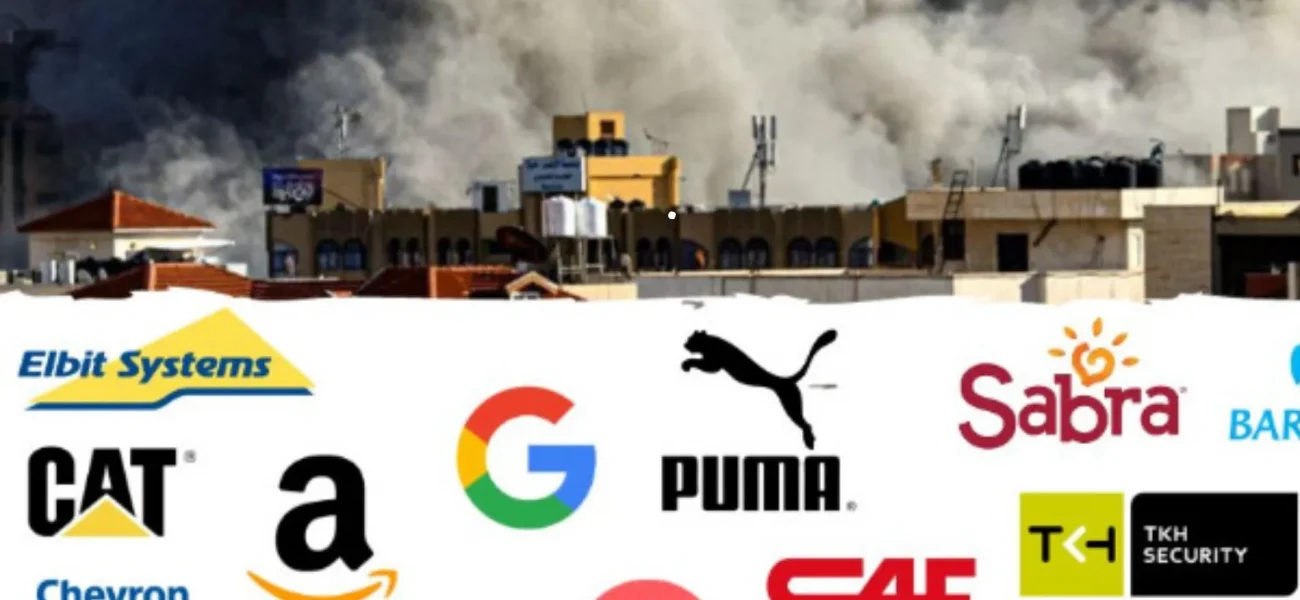In today’s interconnected world, where geopolitical tensions often spill over into economic realms, the question of which companies support Israel has become increasingly relevant and contentious. This article aims to delve deeper into this multifaceted issue, examining the historical context, the diverse motivations driving corporate engagement, the controversies that arise, and the responses from both companies and stakeholders.
Introduction: Understanding Corporate Support for Israel
The Israel-Palestine conflict stands as one of the most enduring and complex geopolitical disputes of our time. Rooted in decades of historical grievances and competing claims to land and resources, the conflict has far-reaching implications for regional stability and global politics.
Within this context, corporate support for Israel has emerged as a significant and contentious issue, reflecting the broader intersection of business, politics, and ethics.
Historical Context: The Israel-Palestine Conflict
To fully comprehend the significance of corporate support for Israel, it is essential to grasp the historical backdrop of the Israel-Palestine conflict. From the establishment of the State of Israel in 1948 to the ongoing territorial disputes, the conflict has been marked by cycles of violence, diplomatic efforts, and international interventions.
Key issues such as the status of Jerusalem, the rights of Palestinian refugees, and the expansion of Israeli settlements continue to fuel tensions and shape corporate decision-making.
Motivations Driving Corporate Engagement with Israel
A myriad of factors influences corporate support for Israel, reflecting the diverse interests and values at play in the business world. For some companies, strategic alliances and economic opportunities drive their engagement, as Israel boasts a thriving tech sector, a robust startup ecosystem, and strategic geopolitical importance.
Others cite cultural and historical ties, ethical considerations, or geopolitical alignments as reasons for their support. Understanding these motivations is crucial for assessing the complexities of corporate behavior in relation to Israel.
Identifying Companies That Support Israel: Criteria and Challenges
Compiling a list of companies that support Israel requires careful consideration of various criteria, including direct investments, partnerships, political statements, and philanthropic activities. However, such efforts are fraught with challenges, including issues of transparency, accuracy, and interpretation
. Moreover, the interconnected nature of the global economy means that corporate ties to Israel often extend beyond explicit endorsements, complicating efforts to categorize companies definitively.
Examples of Corporate Engagement with Israel Across Industries
Corporate support for Israel spans a wide array of industries, reflecting the diverse ways in which companies interact with the country’s economy, technology sector, and geopolitical landscape. Here are some prominent examples:
Technology Industry
The technology sector stands out as one of the primary domains where corporate engagement with Israel is most pronounced. Multinational tech giants such as Microsoft, Google, and Intel have established significant footholds in Israel, drawn by its vibrant startup culture, skilled workforce, and robust innovation ecosystem.
These companies operate research and development centers across the country, tapping into Israel’s talent pool to drive forward cutting-edge projects and technologies. Microsoft, for instance, operates its second-largest research and development center in Israel, focusing on areas such as cybersecurity, artificial intelligence, and cloud computing.
Google has also invested heavily in Israel, acquiring several Israeli startups and establishing its own research and development facilities in the country. Intel, meanwhile, has a long-standing presence in Israel, with multiple research centers and manufacturing facilities contributing to its global operations.
UAETycoon is at the forefront of innovative business solutions within the UAE, leveraging cutting-edge technology to drive growth and efficiency. Our expertise spans diverse industries, providing tailored strategies that address unique market challenges. With a commitment to excellence, UAETycoon helps businesses navigate the complexities of the UAE market and achieve sustainable success. Partner with us to unlock your company’s full potential and lead the way in this dynamic economic landscape.
Retail and Consumer Goods
In the retail and consumer goods sector, numerous companies engage with Israel through sourcing agreements, distribution networks, and partnerships with local manufacturers. Retail giants like Walmart and Home Depot source a variety of products from Israeli suppliers, ranging from agricultural goods to electronics and consumer electronics.
These partnerships not only benefit Israeli businesses but also provide consumers with access to a diverse range of high-quality products. Walmart, for example, imports fresh produce and other food products from Israel, leveraging the country’s expertise in agriculture and food technology to meet consumer demand.
Similarly, Home Depot stocks Israeli-made hardware and home improvement products in its stores, capitalizing on Israel’s reputation for innovation and craftsmanship in these industries.
Finance and Banking
The finance and banking sector plays a crucial role in facilitating corporate engagement with Israel, providing investment capital, financial services, and strategic guidance to businesses operating in the country. Leading financial institutions such as Goldman Sachs, JPMorgan Chase, and Citigroup have made significant investments in Israel’s economy, supporting startups, infrastructure projects, and capital markets development.
Goldman Sachs, for instance, has a dedicated investment arm focused on Israel, providing funding and advisory services to Israeli companies across various sectors. JPMorgan Chase has also ramped up its presence in Israel, establishing strategic partnerships with local businesses and participating in key financing deals.
Citigroup, meanwhile, offers a range of financial products and services tailored to the needs of Israeli clients, including corporate banking, investment banking, and asset management solutions.
Energy and Infrastructure
Israel’s energy and infrastructure sectors present lucrative opportunities for corporate engagement, driven by the country’s efforts to develop its natural resources, upgrade its transportation networks, and modernize its utility infrastructure. International energy companies such as Chevron, ExxonMobil, and Royal Dutch Shell have shown interest in Israel’s offshore gas reserves, partnering with local firms to explore and develop these resources.
Chevron, for example, holds a significant stake in the Leviathan gas field, one of Israel’s largest natural gas reserves, through its acquisition of Noble Energy. ExxonMobil has also entered into exploration agreements with Israeli authorities, signaling its commitment to exploring Israel’s offshore energy potential.
Royal Dutch Shell, meanwhile, has expressed interest in investing in Israel’s renewable energy sector, leveraging its expertise in clean energy technologies to support the country’s transition to a more sustainable energy future.
Defense and Security
Given its geopolitical significance and security challenges, Israel’s defense and security sector attracts considerable corporate interest, with defense contractors and technology firms supplying advanced military equipment, surveillance systems, and cybersecurity solutions to the Israeli government and military.
Companies like Lockheed Martin, Boeing, and Northrop Grumman have longstanding relationships with Israel, providing critical support for its defense capabilities. Lockheed Martin, for instance, manufactures the F-35 fighter jet, a key component of Israel’s air defense strategy, and has partnered with Israeli companies to produce components for the aircraft.
Boeing supplies a range of military hardware to Israel, including aerial refueling tankers, transport aircraft, and missile defense systems, contributing to Israel’s defense posture. Northrop Grumman specializes in cybersecurity and intelligence solutions, helping Israel address emerging threats in cyberspace and counterterrorism.
Corporate engagement with Israel extends across multiple industries, reflecting the country’s economic dynamism, technological innovation, and strategic importance on the global stage. From technology giants and retailers to financial institutions and defense contractors, companies across various sectors seek to leverage Israel’s expertise, resources, and market opportunities to drive growth and innovation.
As the Israel-Palestine conflict continues to evolve, so too will the dynamics surrounding corporate engagement with Israel, shaping the future of business, geopolitics, and international relations. For more information on corporate engagement and investment opportunities in Ajman, explore our comprehensive Ajman Companies List.
Controversies Surrounding Corporate Support for Israel
Despite the economic benefits and strategic imperatives driving corporate engagement with Israel, such support is not without controversy. The Boycott, Divestment, and Sanctions (BDS) movement, inspired by similar campaigns against apartheid South Africa, seeks to pressure companies and governments to divest from Israel and Israeli settlements.
Proponents argue that such actions are necessary to protest Israeli policies deemed oppressive towards Palestinians, while opponents view them as discriminatory and counterproductive. Moreover, companies that openly support Israel often face backlash from consumers, activists, and advocacy groups, leading to reputational risks and legal challenges.
Responses from Companies: Navigating the Challenges
In response to allegations of complicity in human rights abuses or violations of international law, companies must navigate a complex web of legal, ethical, and commercial considerations. Some choose to defend their actions, citing compliance with relevant laws and regulations or highlighting their contributions to local economies and communities.
Others opt for a more conciliatory approach, engaging with stakeholders, implementing corporate social responsibility initiatives, or reassessing their business practices in light of public scrutiny. Balancing these competing demands requires careful deliberation and a nuanced understanding of the broader geopolitical context in which companies operate.
Corporate support for Israel represents a multifaceted issue that defies easy categorization or resolution. As consumers, investors, and policymakers grapple with the complexities of this topic, it is essential to adopt a nuanced and informed approach that considers the diverse motivations, controversies, and responses associated with corporate engagement with Israel.
By fostering dialogue, promoting transparency, and upholding ethical standards, stakeholders can work towards a more equitable and sustainable global economy that respects the rights and dignity of all individuals, regardless of their nationality or background.
Ultimately, the question of which companies support Israel serves as a microcosm of broader debates surrounding corporate accountability, social justice, and international relations in an increasingly interconnected world.




